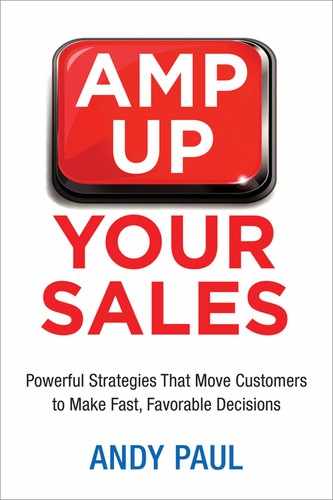CHAPTER 9
Winning the Sale
This is the final ingredient for your recipe for sales success. There’s nothing more important in selling than maintaining an unshakeable focus on … well, you know this by now, don’t you?
Quick, answer this question: What should be the primary focal point of every step of your sales process? The customer, of course.
But that’s only a partial answer. Remember our definition of selling? It’s about questions and answers. The customer asks questions in order to gather information to make a buying decision.
As a salesperson, providing that information should inform everything you do. When you plan your sales calls, you know what you need to do. When your manager reviews your accounts and asks you what the next step will be with a particular prospect, you’ll have the answer. And if ever you find yourself at a loss for what next step to take with a prospect, you can just ask yourself the question, “What information does the customer need from me right now in order to take at least one step forward in the decision-making process (or buying cycle)?”
There’s a lot to be said for taking a long-term perspective in sales. Deals can often take a long time to come to fruition. During parts of my career, I sold multimillion-dollar communications systems with a multiyear sales cycle. But irrespective of the length of the sales cycle/buying process, if you’re too focused on winning the order, you may end up losing the sale. I know that may sound confusing. I’ll explain.
Let’s start with an important factor that you don’t learn in sales training: Your customers make up their minds about which seller they’re going to buy from fairly early in their buying process. This happens long before they place an order. From that point forward, they are using their buying process to validate that decision. This is not to say that customers have made an irrevocable decision to purchase from particular suppliers. But they’ve developed a strong preference based on their perceptions of the value those sellers have provided from the beginning of their buying process. (In Chapter 13, I’ll show you how to positively influence the customer’s initial perceptions of you.)
Such a seller has achieved what I call “winning the sale.” She hasn’t won the order. That could still take some time. But if she can shepherd the prospect through the rest of his buying process without tripping over herself or making some obvious error, then, to use the old sales cliché, the business is hers to lose. All the other competitors in the deal are wasting precious selling time fighting for second place—and they don’t even know it.
If you have worked in sales for any period of time, you’ve experienced that moment when the customer flips the mental switch and decides that you are the seller he wants to do business with. Personally I know the exact moment that happens in every sales opportunity I work on. I can look back on countless sales calls over the course of my career during which I knew the customer had made the mental decision to work with me. I knew I had won the sale. It still took some time to get the order, though. In one case, it took ten months after winning the sale to finally get the customer’s order in hand. But during that time I knew that, if I just continued to maintain my primary sales focus on supporting the customer’s decision making, I would indeed win the order.
Unfortunately, short of the prospect’s telling you, there’s no way to know with 100 percent certainty whether you’ve won the sale. Over time, your experiences and expertise will blend to give you a reliable intuitive indicator of where you stand. But even then, the only way to sell is as though all your prospects are going to make up their minds about you on your very first sales call.
Which brings us back to your sales focus. I want you to narrow it down just a bit further. If you’re going to sell as if your customers were going to make a decision on the very first sales call, then your sales focus needs to be even tighter. Instead of providing information to help customers make a purchase decision, your focus should be on providing value that will win the sale on this call. This value could be in the form of asking the right questions that demonstrate you have a true understanding of the customers’ pain points and requirements. The value could come from questions you pose or insights you provide about their business that cause them to reshape their vision of the solution that’s required. Or the value could flow from providing thorough answers to their highest-priority questions and concerns.
I want you to remember that winning the sale means that you’ve helped your customers make a decision. Even if it’s a preliminary decision, it’s one that they could not have made if you hadn’t provided something of value to them. That value could have come from something as mundane as quickly responding to an inquiry or as simple as asking the right questions that demonstrate to your customers that you really understand their requirements. In upcoming chapters, I’ll show you how to maximize the value of every customer interaction in order to win the sale on the first call.
It can take a long time to get an order. But with the right focus, it won’t take long at all to win the sale.
